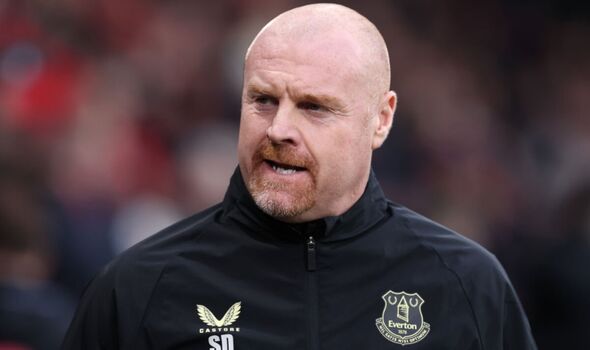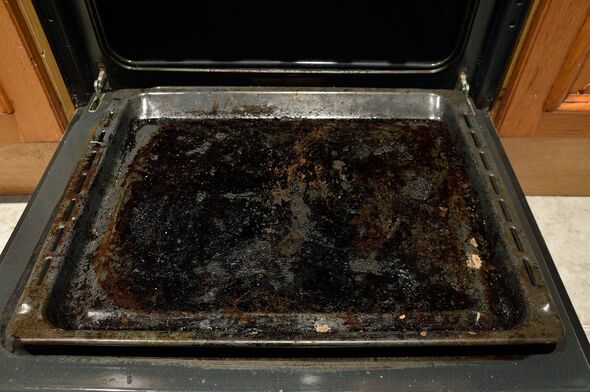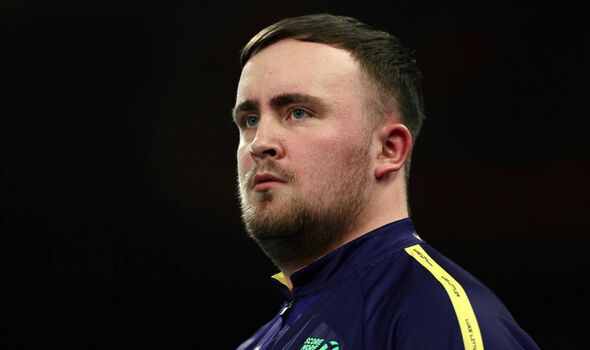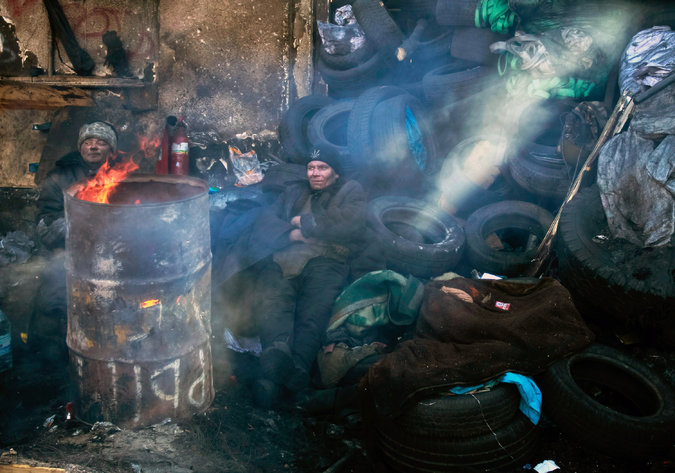
US and Europe Work on Aid Package for Ukraine
February 4, 2014
Nike Presents New Basketball Hat Collection
February 5, 2014This Friday, the Winter Olympics open in the Russian resort of Sochi amid great controversy over the Putin regime’s homophobic policies, which clearly violate the anti-discrimination Principle 6 of the Olympic Charter.
For me, queer freedom knows no borders. Over the last decade or so, amazing positive gains have been won by the lesbian, gay, bisexual and transgender (LGBT) communities in Britain. We’ve gone from being the country with the largest number of homophobic laws in the world in 1999, to having some the best laws on sexual orientation and gender identity today.
But I am an internationalist, not a nationalist. We must not give up the fight until every LGBT person on this planet has equal human rights, respect, dignity and opportunity.
That’s why I am passionately opposed to what is now happening to LGBT people in Russia.
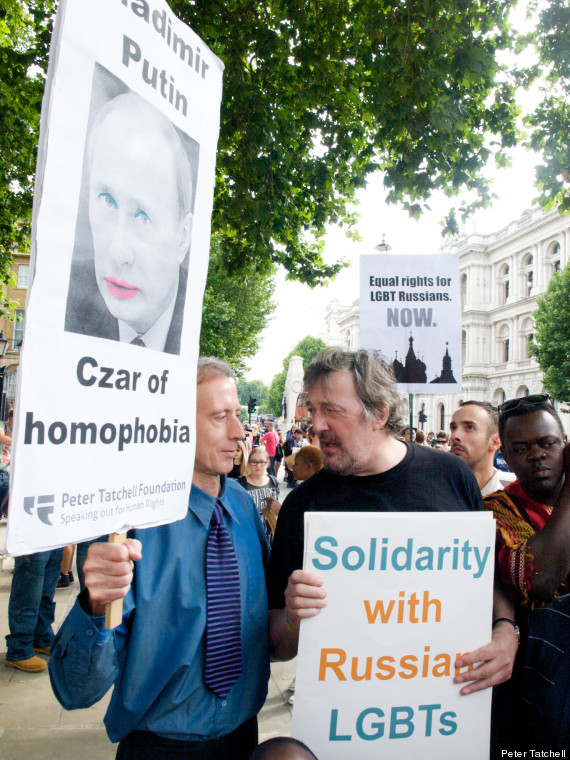
L-R Peter Tatchell and Stephen Fry at the recent protest outside the Russian Embassy in London
After a brief period of post-communist liberalisation in the 1990s, Russia is heading backwards for sexual minorities. Even the awful, authoritarian post-war Soviet era was not as explicitly and overtly homophobic as Russia under president Vladimir Putin.
The most outrageous homophobic escalation is the new anti-gay law that came into force in Russia in the summer of 2013. It bans the promotion of ‘non traditional’ sexual relations to young people under the age of 18. The reality is that this law is being interpreted to criminalise any LGBT visibility or advocacy regardless of whether a young person has seen it or not.
A young a man who held up a sign saying ‘homosexuality is normal’ was arrested under the new anti-gay legislation; even though there was no evidence that a person under the age of 18 witnessed him or his sign. Another was detained for displaying a rainbow flag. Teachers are being sacked from their jobs simply because they are gay or lesbian. Child welfare groups, such Children-404, which provide supportive, affirmative counselling to often depressed and suicidal LGBT teens, are being harassed, threatened with closure and prosecuted.
The new Russian anti-gay law is truly draconian. It is now a crime to depict homosexuality as ‘interesting’ or ‘attractive’. It’s also an offence to suggest that homosexuality and heterosexuality are equally valid. This means that it is prohibited to provide young gay people with safer sex and HIV prevention information. Gay organisations will face legal penalties if they have any members under 18 or advocate for their welfare. The Russian state is effectively forcing, by threat of legal sanction, the neglect and abandonment of LGBT youth. Anyone who helps them, gay or straight, can be prosecuted under this nasty new law.
The legislation has given state sanction to an intensely homophobic atmosphere. Gay bashing is rife. Ultra nationalists are luring young gay men off the internet to rendezvous and then torturing, abusing and humiliating them – and then posting photos and videos of the abuse on social networks. There is an atmosphere of real terror. At least two gay men have been murdered. The police do little or nothing.
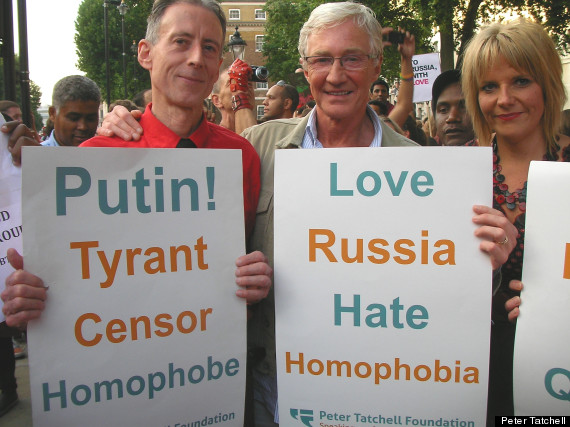
L-R Peter with Paul O’Grady at the London protest
Many Russian LGBT people who were previously open about their sexuality have gone back in the closet because they fear arrest, violent attack or eviction from their jobs and homes. Against their wishes, they feel obliged to moderate their speech, dress, hairstyle and mannerisms when they are in public places, in order to avoid victimisation by the police and homophobic gangs. They know the threat of arrest and violence is potentially around the next corner.
Much of the drive for this intensified gay repression is coming from far right ultra nationalists, neo-Nazis, Putin’s youth movement and the Russian Orthodox Church. Many of them want to recriminalise homosexuality and pass a law that deprives LGBT parents of their children. These are the feared next big legislative repressions.
By approving the new anti-gay law, the Russian government is giving tacit license, even approval, to this homophobic witch-hunting atmosphere.
The attacks on the LGBT community are not happening in isolation. They are part of a wider attack on Russian liberties. It would be a huge mistake to focus simply on violations of gay rights. This would isolate and marginalise gay Russians. That’s why many of them are making sure this fight for LGBT rights is fought and won as part of the battle for the human rights for all Russian people. A LGBT-straight alliance is being forged.
What’s happening in Russia is not taking place on the far side of the world in a country with a hugely different cultural background. It’s happening on the doorstep of Europe – in a major world nation that has contributed a lot to human civilisation, especially in the fields of art and culture.
Russia wants to be part of the European family. Fine. But the anti-gay law clearly violates the equality and freedom of expression clauses of the Russian constitution and of the European Convention on Human Rights, which Russia has signed and pledged to uphold. All that LGBT Russians are asking is that Russia honours its own constitution and the European convention.
Sadly, the vast majority of Russians support the new law against LGBT people. A great many think homosexuality should be illegal and homosexuals locked-up. A sizable minority believe gay people deserve to die. It’s a form of collective homophobic hysteria based on prejudice, fear and ignorance; stoked by President Putin and his allies as a crude way to distract public attention from unresolved big issues such as corruption, the embezzlement of state assets, rural
neglect and ethnic and religious tensions.
If homophobia was a Winter Olympic sport, Russia would be a gold medal contender.
To find out more about Peter Tatchell’s human rights campaigns and to make a donation: www.PeterTatchellFoundation.org


